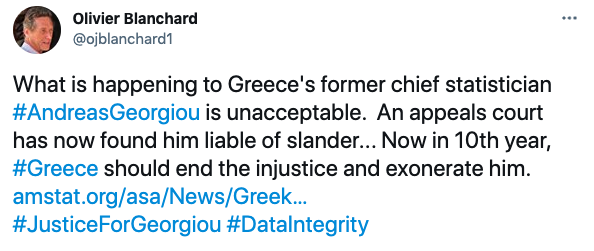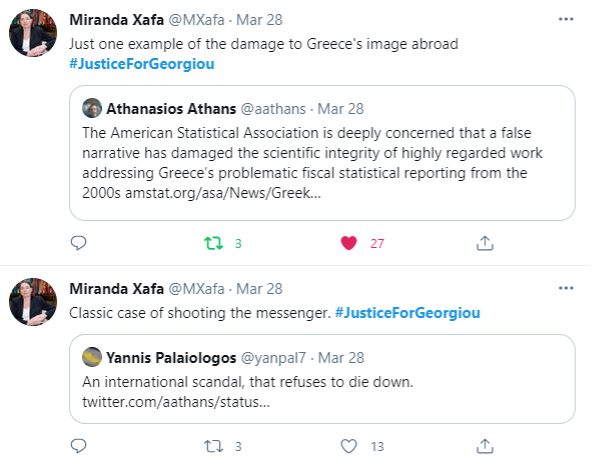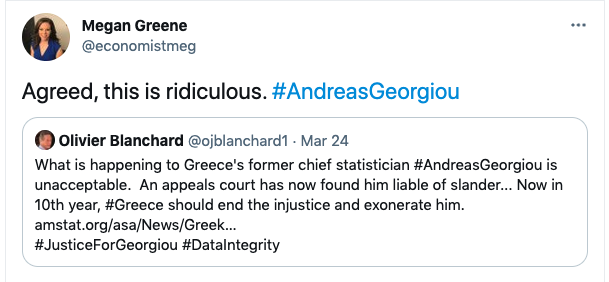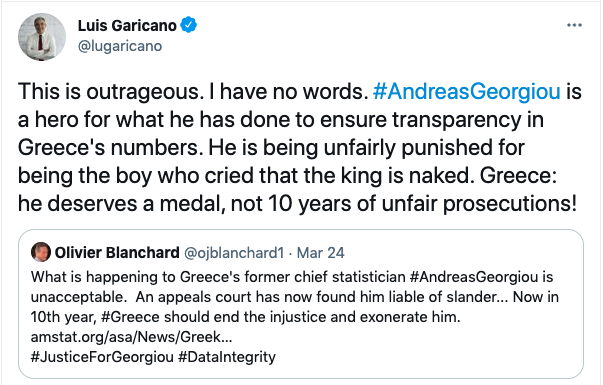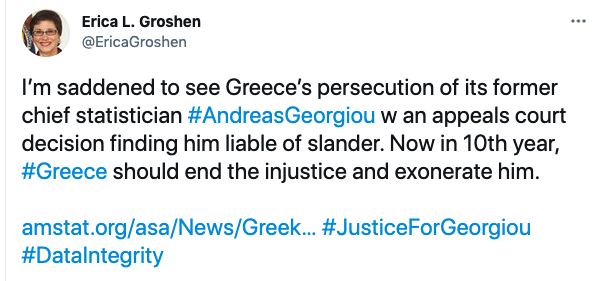ASA, International Community Continue to Decry Georgiou Persecution
Steve Pierson, ASA Director of Science Policy, and Lynn Wilkinson, Friends of Greece
Following this winter’s Greek appeals court ruling finding former Greek chief statistician Andreas Georgiou liable for slander, ASA leaders denounced the latest legal setback against Georgiou. “Persecuting a scientific government official for doing his job with rigor and integrity to produce official statistics is deeply concerning,” said ASA President Robert Santos.
“Prosecuting Georgiou for stating what is widely validated and fulfilling his official responsibilities is a travesty,” added ASA Executive Director Ron Wasserstein.
Echoing ASA Board statements, both ASA leaders urged Greece to end its now 10-year persecution of Georgiou and signal Greece’s commitment to accurate and ethical government statistics by fully exonerating him.
The ASA joins international partners in requesting your support of Georgiou by posting to LinkedIn and Twitter urging Greece to end its persecution of Georgiou and exonerate him using the hashtags #AndreasGeorgiou and #JusticeForGeorgiou.
The international community also spoke out, including through social media. In a March 29 opinion piece for the Greek newspaper Kathimerini, prominent Greek economist Miranda Xafa wrote, “Georgiou’s prosecution has done enormous damage to Greece’s image abroad and has called into question the country’s ability to understand that the huge fiscal imbalance was real, not a conspiracy to impose austerity.”
John Bailer and John Pullinger, presidents of the International Statistical Institute and International Association for Official Statistics, respectively, echoed the calls for Greece to end the persecution of Georgiou and exonerate him, reiterating in a joint statement their “grave concern that these continued prosecutions have damaged the scientific integrity of highly regarded work addressing Greece’s problematic fiscal statistical reporting from the 2000s.” They added that Georgiou’s “case has implications for the international statistical system, and the rights of government statisticians to defend their statistics,” saying that “[d]efending official statistics … should not lead to legal prosecution.”
German data scientist Katharina Schueller in a March 2021 LinkedIn article wrote, “In this case, not only the fate of a single statistician is at stake. … It is also about the incentive structures for Greek official statisticians now and in the long term. What happens in this case, when it reaches the Greek Supreme Court, will have repercussions in Greece and in the wider EU, both for the rule of law and human rights, and for the soundness of policies based on honest and reliable official statistics.”
The slander charge pertains to a public statement Georgiou made in his official role while fulfilling his responsibility to defend the fully validated official deficit and debt statistics for Greece produced under his leadership.
Background
“The game is over; we need serious statistical data.” ~ Jean-Claude Juncker, President, Eurogroup, 2005–2013
“I am seriously concerned about significant statistical discrepancies… [which] will require an open and deep investigation of what has happened.” Joaquin Almunia, Commissioner, EU Monetary Affairs, 2004–2009
One of the conditions the European Union (EU) imposed upon Greece in the beginning of 2010 during the early days of the Greek debt crisis was significant reform of the statistical office. In this context, further illustrated by the quotes above from 2009, Georgiou was recruited to head the recast national statistical office—the Hellenic Statistical Authority (ELSTAT)—with a mission to modernize the production of official statistics, apply fully the EU rules for the production of these statistics, and ensure ELSTAT’s independence and overall implementation of statistical ethics.
Georgiou’s priority when he took the helm of ELSTAT in August 2010 was to address concerns repeatedly voiced by European and international partners about the credibility of previous Greek economic statistical figures. Therefore, one of Georgiou’s first responsibilities was to oversee a recalculation of the public finance statistics for 2006–2009 that Eurostat, the EU’s statistical office, could not validate and which had been adjusted several times during the lead-up to the debt crisis. It was the fully corrected public finance figures produced under Georgiou’s leadership that allowed Greece to continue to qualify for the EU and International Monetary Fund (IMF) loans given to help its struggling economy through a tough fiscal adjustment process.
However, because of the austerity measures that came with the loans, Georgiou quickly became a scapegoat, blamed by leaders across the Greek political spectrum for the debt crisis, the full size of which his work had uncovered. As the effects of the austerity measures started to be felt, criminal investigations were initiated against Georgiou in September 2011. Greece proceeded to prosecute Georgiou for doing his job to produce accurate, complete, and current public finance statistics, starting with charges of falsifying the magnitude of the deficit and violation of duty (for not allowing a vote on the statistics).
At the time the slander charges originated (2014), Georgiou had already been investigated twice on charges of falsifying the deficit and violating his duty. Both investigations concluded there was no evidence to support the charges and, both times, the conclusion was ignored and another investigation was initiated. Georgiou was about to face a third investigation and, at this time, the deficit figures produced under Georgiou’s watch had been accepted by Eurostat without reservations eight times in a row over a span of four years (2010–2014).
Reacting to these continued, relentless attacks on the statistics produced under his leadership, Georgiou issued a strenuous public defense of the integrity of these statistics. He also noted the lack of recognized validity for the originally provided data for 2006–2009 by Eurostat and others and pointed out that no investigation of these statistics had ever been conducted. This fact remains true to this day.
Public comments about government statistics are a standard practice around the world and in accordance with the European Statistics Code of Practice, as well as the UN Fundamental Principles of Official Statistics. Public comments are also in accordance with one’s democratic right to free speech, including in Greece.
Nevertheless, both criminal and civil charges were instigated against Georgiou by the former (2006–2010) director of the national accounts division of the statistics office, who was responsible for the production of the deficit and debt statistics Eurostat could not validate.
Georgiou was found guilty of simple slander in criminal court. His first appeal of this decision failed, but the Greek Supreme Court annulled it for extraordinary legal errors. Simple slander, under Greek law, means that even though the statements Georgiou made were true, he should not have made them because they damaged the honor and reputation of the plaintiff.
2021 Civil Appeals Court Ruling on Slander
The latest ruling concerned the civil suit for simple slander by the same plaintiff. In 2017, Georgiou was ordered to pay damages of €10,000 to the plaintiff and publish large parts of the convicting decision as a public apology. After numerous delays, the appeals court held its hearing on this case in September 2020. In its 2021 decision, the appeals court rejected Georgiou’s appeal and upheld the decision of the lower court, including damages of €10,000 (plus interest) and the public apology.
Georgiou said he plans to appeal the ruling to the Greek Supreme Court, adding, “The stakes in this case are not only personal for me. They are about following statistical principles in the various processes of producing and reporting official statistics, including defending validated official statistics in the face of destructive criticisms. They are also about incentive structures for official statisticians in Greece now and for the long term. Moreover, the outcome of this case can potentially indirectly affect the conditions for official statisticians anywhere in the world.”
The Greek government has also funded a significant portion of the plaintiff’s legal costs to pursue the slander accusation against Georgiou. The law under which these funds were granted was meant to support official statisticians in their legal defense, and it is a perversion of the law that these provisions have been used for a prosecution.
Public funding for the head of ELSTAT is part of a 2017 agreement between the European Commission, Greece, and The Bank of Greece for that year’s disbursement of €7.7 billion. The agreement held that Greece must “legislate the State indemnification of the ELSTAT President—and other ELSTAT officials acting upon his/her authority—against legal and other costs … incurred as a result of legal challenges/actions/proceedings taken or threatened against them in relation to decisions made and actions taken … pursuant to carrying out their official functions in compliance with applicable provisions and rules, statutory or otherwise.” The agreement referenced a 2012 Greek government commitment “to support ELSTAT in upholding confidence in Greek statistics and to defend them against any efforts to undermine their credibility.”
Perpetuation of False Narrative
In their statements, Santos and Wasserstein equated Greece’s continued prosecution of Georgiou with the perpetuation of a false narrative. As noted above, the official statistics produced under Georgiou have been widely and repeatedly validated. Further, the ELSTAT methods Georgiou put in place for producing Greek official statistics are still in use.
Praise for Georgiou
While understanding the hardships of the Greek people because of the austerity measures, Santos stated Georgiou “was unjustly cast as the scapegoat for the austerity measures put in place with the EU and International Monetary Fund loans from the early 2010s to help Greece’s then-struggling economy.”
Referring to the broader impacts of the scapegoating of Georgiou, Santos said, the ASA is “deeply concerned that a false narrative has damaged the scientific integrity of highly regarded work addressing Greece’s problematic fiscal statistical reporting from the 2000s.”
Wasserstein reiterated the point, saying, “The ASA sees the continued perpetration of a false narrative and persecution of an honest and highly capable official statistician as an injustice, a violation of Georgiou’s human rights, and a detriment to Greece’s reputation and economy.”
His American lawyer, Robert Kyle, working on a pro-bono basis, said in an email, “The persecution of Mr. Georgiou is an affront to truth and government integrity that ultimately undermines the credibility of Greek statistics. The Greek Government should do everything in its power to right this wrong.”
This false narrative can still be found in Greek media today.
Human Rights Violations
Besides the injustice of the prosecutions, the harm to Greece’s reputation, and the undermining of official statistics, Greece’s treatment of Georgiou is also a violation of Georgiou’s human rights. Indeed, both the 2019 and 2020 US State Department Country Reports on Human Rights Practices for Greece include several sentences about Georgiou. The language for both is similar, with the 2019 language excerpted here:
Observers reported the judiciary was at times inefficient and sometimes subject to influence and corruption. … On February 28, the Council of Appeals cleared, for the third time, the former head of the Hellenic Statistical Authority, Andreas Georgiou, of charges that he falsified 2009 budget data to justify Greece’s first international bailout. The Supreme Court prosecutor had twice revoked his acquittal by the Council of Appeals. … EU officials repeatedly denounced Georgiou’s prosecution, reaffirming confidence in the reliability and accuracy of data produced by the country’s statistical authority under his leadership.
Rebecca Everly, director of the Committee on Human Rights of the National Academies of Sciences, Engineering, and Medicine, said, “We are deeply concerned that Dr. Andreas Georgiou has faced and continues to face legal proceedings solely for carrying out his scientific work and responsibilities during his five-year tenure as president of Greece’s national statistics office. Dr. Georgiou is a deeply respected scientist whose service to Greece should be supported, not targeted.”
While also speaking against the latest ruling, Wasserstein thanked and praised Georgiou. “I’m sorry for all Georgiou has had to endure, but I also commend, and am grateful for, his defense of official statistics. With his perseverance and strength, he is an exemplary embodiment of the commitment of an official statistician to produce the most reliable, impartial data possible.”
The praise echoed a 2018 commendation from six statistical societies for Georgiou’s “competency and strength in the face of adversity, his commitment to the production of quality and trustworthiness of official statistics and his advocacy for the improvement, integrity and independence of official statistics.”
The ELSTAT data produced under Georgiou and their specific methodology has been checked and accepted 22 times since 2010 by Eurostat in its semiannual quality assurance procedures provided for in European law. In addition, the statistical processes and ethics characterizing the production and dissemination of these official statistics under Georgiou’s watch are considered by the international statistical community to be fully consistent with international statistical principles and ethics.
For more information about Georgiou’s battle for justice, contact ASA Director of Science Policy Steve Pierson.
Influencers Speak Out
Following the latest legal setback for Georgiou, the international community questioned Greece’s continued hounding of Georgiou on social media using the hashtags #AndreasGeorgiou and #JusticeForGeorgiou. Among the scores of people who tweeted were the following significant influencers:Olivier Blanchard, Robert Solow Professor of Economics Emeritus, MIT, 77,000 followers:
Nicholas Christakis, Sterling Professor of Social and Natural Science, Yale University, 181,000 followers:
Miranda Xafa, former IMF representative to Greece and former chief economic adviser to the prime minister of Greece, 12,800 followers:
Federico Fubini, journalist, 44,000 followers, retweeting Blanchard’s post:
Megan Greene, senior fellow, Harvard Kennedy School, 55,700 followers, retweeting Blanchard’s post:
Luis Garicano, member of the European Parliament from Spain, 85,600 followers, retweeting Blanchard’s post:
Erica Groshen, former Bureau of Labor Statistics commissioner, 2,700 followers:


